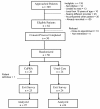A pilot with computer-assisted psychosocial risk-assessment for refugees
- PMID: 22800506
- PMCID: PMC3461470
- DOI: 10.1186/1472-6947-12-71
A pilot with computer-assisted psychosocial risk-assessment for refugees
Abstract
Background: Refugees experience multiple health and social needs. This requires an integrated approach to care in the countries of resettlement, including Canada. Perhaps, interactive eHealth tools could build bridges between medical and social care in a timely manner. The authors developed and piloted a multi-risk Computer-assisted Psychosocial Risk Assessment (CaPRA) tool for Afghan refugees visiting a community health center. The iPad based CaPRA survey was completed by the patients in their own language before seeing the medical practitioner. The computer then generated individualized feedback for the patient and provider with suggestions about available services.
Methods: A pilot randomized trial was conducted with adult Afghan refugees who could read Dari/Farsi or English language. Consenting patients were randomly assigned to the CaPRA (intervention) or usual care (control) group. All patients completed a paper-pencil exit survey. The primary outcome was patient intention to see a psychosocial counselor. The secondary outcomes were patient acceptance of the tool and visit satisfaction.
Results: Out of 199 approached patients, 64 were eligible and 50 consented and one withdrew (CaPRA=25; usual care=24). On average, participants were 37.6 years of age and had lived 3.4 years in Canada. Seventy-two percent of participants in CaPRA group had intention to visit a psychosocial counselor, compared to 46% in usual care group [X2 (1)=3.47, p=0.06]. On a 5-point scale, CaPRA group participants agreed with the benefits of the tool (mean=4) and were 'unsure' about possible barriers to interact with the clinicians (mean=2.8) or to privacy of information (mean=2.8) in CaPRA mediated visits. On a 5-point scale, the two groups were alike in patient satisfaction (mean=4.3).
Conclusion: The studied eHealth tool offers a promising model to integrate medical and social care to address the health and settlement needs of refugees. The tool's potential is discussed in relation to implications for healthcare practice. The study should be replicated with a larger sample to generalize the results while controlling for potential confounders.
References
-
- United Nations High Commissioner for Refugees. Capacities and contributions of host countries. In statistic year book. 2009.
-
- Canadian Immigration and Citizenship (CIC) Backgrounder: refugees and Canada's refugee system. 2008.
-
- Olness K. In: Handbook of immigrant health. Loue S, editor. New York, Plenum Press; 1998. Refugee health; pp. 227–242.
-
- Allodi F, Rojas A. The role of a housing cooperative community in the mental health and social adaptation of Latin Americn refugees in Toronto. Migration World Magazine. 1988;16(3):17–21.
Publication types
MeSH terms
LinkOut - more resources
Full Text Sources


